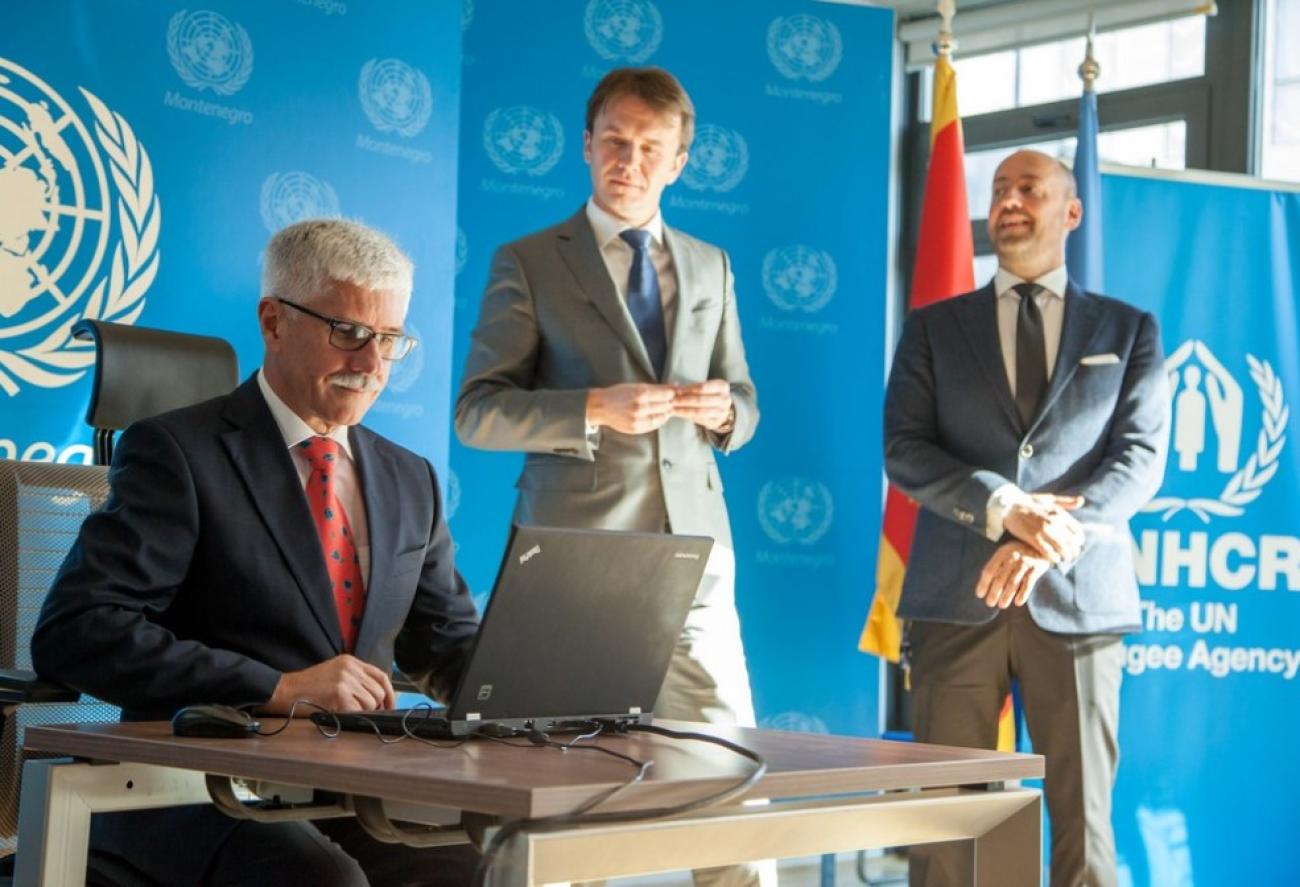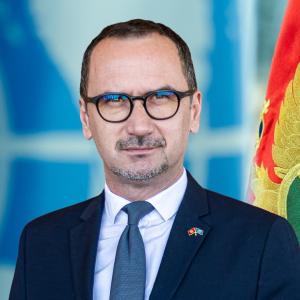The United Nations in Montenegro, headed by the UN Refugee Agency, UNHCR, placed ending statelessness in the world at the heart of the Human Rights Day 2014 in Montenegro, commemorated at the UN Eco Building. The UN Resident Coordinator a.i, Benjamin Perks, the Minister of Interior, Rasko Konjevic and the Head of the Delegation of the European Union to Montenegro, Mitja Drobnič, signed the Open Letter, a digital petition for ending statelessness in the next 10 years and supported UNHCR’s global campaign, #IBelong.
UNHCR launched the campaign on November 4, 2014, with the aim of ending statelessness that affects more than 10 million people around the world.
At the high level event organised in the UN Eco House in Podgorica, the UN Resident Coordinator a.i. Benjamin Perks, stressed out difficulties which stateless persons face on a daily basis.
“For stateless persons, the most mundane and basic of activities: the right to a name, to attend school, to work, get married, open a bank account, travel or find housing are beyond reach. Children are born into statelessness and old people pass away without a death certificate: statelessness is intergenerational, undermines the dignity and wellbeing of those affected and in some cases deprives entire communities”
Benjamin Perks, UN Resident Coordinator a.i. and UNICEF Representative
The Convention relating to the Status of Stateless Persons, Convention on the Reduction of Statelessness and the Universal Declaration of Human Rights regulate the acquisition, loss or denial of citizenship. Despite that, statelessness in the world affects more than 10 million people, with more than a third being children. With this in mind, the United Nations High Commissioner for Refugees, Mr. Antonio Guterres, addressed an Open Letter inviting governments and people around to world to join the global campaign by signing the letter digitally, at: http://ibelong.unhcr.org/en/home.do. The aim of the campaign is to gather 10 million signatures of support – 1 for each stateless person in the world.
The government of Montenegro ratified all international and European documents relating to statelessness. However, the government lacked comprehensive data on statelessness, the only indicator being the 2011 Census, where 4,312 persons declared they live without nationality. The lack of adequate data obstructs development of concrete measures that address statelessness at its roots.
In agreement with UNHCR, the Government of Montenegro launched a two-month Public Call to stateless persons, inviting them to register at the branch offices of the Ministry of Interior. The government and UNHCR will analyze the results of the Public Call, based on which concrete measures and recommendations will be prepared in 2015.
“Since the beginning of the application of the Montenegrin Citizenship Act, the Ministry of Interior received altogether 33.000 requests for citizenship. Of these, 31.000 requests have been solved, with 1.700 being in the procedure. Also, we must not forget an example of dedication, care and intent of the Government of Montenegro to help all persons regulate their legal status, the Public Call for stateless persons. By the end of the call, 486 persons applied at the local branches of the Ministry of Interior”
Raško Konjević, Minister of Interior
UNHCR insists that statelessness is a problem largely avoidable and that political will renders it entirely solvable, too. Legal reforms and birth registration are one of the key recommendations stipulated by both the Special Report and the Global Action Plan.
The Government of Montenegro works on establishing precise procedures of subsequent birth registration into its legislation, whose absence substantially impacts the birth registration and its harmonised implementation across the country. UNHCR actively participated in the working groups drafting adequate legislative provisions and advocated its proposed solutions through public events. The draft amendments to the Law on Non-Contentious proceeding, pending endorsement from the Parliament, are a good indicator that the birth registration procedure will be precisely defined in 2015.
“It is crucial to continue efforts to improve birth registration and facilitate subsequent registration or re-registration in civil registers. We commend Montenegro for taking a similar initiative and we encourage the Parliament to adopt amendments to the Law on non-contentious proceedings which will facilitate subsequent birth registration. This will allow the most vulnerable category among the stateless persons – children – to resolve their status”
Mitja Drobnič, Head of the Delegation of the European Union to Montenegro
The campaign #iBelong marks the 60th anniversary of the adoption of the Convention relating to the Status of Stateless Persons. For the purposes of the campaign, UNHCR developed a Special Report which personalizes statelessness as a life story of millions of people and a Global Action Plan that provides specific recommendations to states actively working to end statelessness.
Although much work remains to be done over the course of a 10-year campaign, with sufficient political will solving statelessness entails relatively simple and low-cost reforms that can have immediate and permanent impact. Regional cooperation can help drive this process a step further. The governments of Montenegro and Kosovo, assisted by the UNHCR offices in Podgorica and Pristina, provided registration and issuance of civil documentation at refugees’ doorstep, through the work of their mobile teams.
So far, 477 persons received birth extracts through the work of mobile teams, which facilitates their birth registration, regulation of their legal status in Montenegro and alleviates their risk of being stateless. The achieved results give hope that Montenegro will see an end to statelessness in the future.





